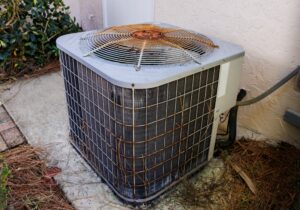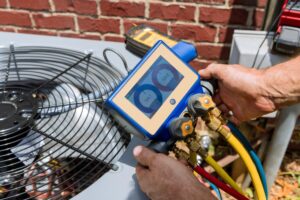When it’s time to invest in a new heating system, you’ll encounter various factors to consider, from the size and type of the furnace to the features it offers. One of the most crucial aspects, however, is the furnace’s efficiency. Why? Because the more efficient your furnace is, the less energy it uses to heat your home — which translates to lower energy costs and a reduced environmental impact.
But how do you measure furnace efficiency? It all comes down to something called the AFUE rating. Let’s explore what AFUE stands for, how it affects your energy costs, and what a good AFUE rating means for you.
What Is an AFUE Rating?
AFUE, which stands for Annual Fuel Utilization Efficiency, is the standard measure used to assess a furnace’s efficiency. Essentially, it indicates how effectively a furnace converts fuel into heat over an average heating season. The Department of Energy developed AFUE ratings as a way to help consumers gauge the efficiency of their residential heating systems and make informed decisions.
For instance, if a furnace has an AFUE rating of 90%, that means 90% of the fuel it uses goes directly toward heating your home, while the remaining 10% is lost through exhaust or other processes. In other words, a higher AFUE rating signifies a more energy-efficient system.
The calculation is based on the total annual heat output divided by the total fuel input — thus giving you a clear picture of how well your furnace is turning fuel into heat. This efficiency rating is most commonly found on gas furnaces, as well as other types of furnaces.
How Do AFUE Ratings Affect Energy Costs?
The higher the AFUE rating on a furnace, the more efficiently it heats your home, which has a direct impact on your energy savings. For example, replacing an older furnace with a high-efficiency model can make a noticeable difference in your utility bills over time.
Older furnaces often have an AFUE rating of around 80%, meaning that up to 20% of the energy is wasted. Upgrading to a furnace with a 90 AFUE rating or higher can reduce that waste significantly. Think of AFUE as a percentage of what you’re paying for fuel that actually contributes to warming your home. So, if you’re paying $100 for fuel and have an AFUE rating of 90%, you’ll be getting $90 worth of heat for your home, whereas with a 70% AFUE rating, you’re only getting $70 worth of heat.
To put it simply, high-efficiency furnaces with higher AFUE ratings mean you’re getting more value from the fuel you pay for. This is particularly important for homeowners in colder climates or those who rely on heating for a large part of the year, as energy costs can add up quickly.
What Is a Good AFUE Rating?
When preparing to invest in a new furnace installation, it’s important to know what counts as a “good” AFUE rating. Generally speaking, an AFUE rating above 80% is considered acceptable, while ratings of 94% or higher are often seen as excellent.
Furnaces with AFUE ratings of 90% and above are ideal for those seeking maximum efficiency and savings. However, they also tend to come with a higher initial cost. That being said, the energy efficiency gains typically make up for the upfront investment over the long term, especially in colder climates where the heating system is in constant use.
What’s the Minimum AFUE Rating?
The Department of Energy has set minimum efficiency standards for furnaces. In most areas of the United States, the minimum AFUE rating for new gas furnaces is currently set at 80%. This means that all new furnaces must meet or exceed this rating. An 80 AFUE furnace is capable of converting 80% of the fuel it consumes into usable heat, with the remaining 20% lost.
While an 80% AFUE furnace meets the minimum standard and provides adequate efficiency for many homes, you may want to consider a higher-rated unit if energy efficiency and long-term savings are priorities for you. Keep in mind that a good AFUE rating for a furnace depends on your specific needs, your home size, and your local climate.
How Do You Find an AFUE Rating on a Furnace?
Locating the AFUE rating on a furnace is quite simple, as manufacturers typically display this information on a label right on the unit. When you’re looking for the AFUE rating on a furnace, you’ll want to start by checking the furnace’s data plate, which is usually found inside the access panel or on the side of the unit. This label provides a wealth of information, including the model number, serial number, and, of course, the AFUE rating.
If you’re unable to find the rating on the unit itself, you can also check the owner’s manual or the manufacturer’s website. Most brands publish specifications online, so you can look up the exact AFUE rating for your specific furnace model. Another option is to reach out to the installer or dealer who sold you the furnace. They should have this information readily available, especially if you’ve purchased the furnace recently.
Other Factors Affecting Furnace Efficiency
It’s also worth noting that while the AFUE rating gives you a good indication of a furnace’s fuel efficiency, it doesn’t take into account other factors like routine furnace maintenance and ductwork efficiency. A high-efficiency furnace won’t reach its full potential if it’s not properly maintained or if your duct system is leaky or inefficient. Regular maintenance ensures that your furnace continues to operate at its peak efficiency, regardless of the AFUE rating.
Get Help Choosing the Right Furnace for Your Home
Selecting the right furnace goes beyond just looking at the AFUE rating on furnace labels. It’s about finding a system that suits your needs, provides comfort, and doesn’t break the bank on energy costs. At H.J. Faust, Inc., we specialize in new furnace installations and can help you find a furnace with the perfect balance of efficiency and affordability. Whether you’re interested in a furnace with a higher AFUE rating for maximum savings or simply want to replace an outdated model, our knowledgeable team is here to help.
Contact us today to learn more about AFUE ratings and find the perfect high-efficiency furnace to keep your home warm and cozy. With years of experience in residential heating solutions, we understand what works best for your home and budget.



